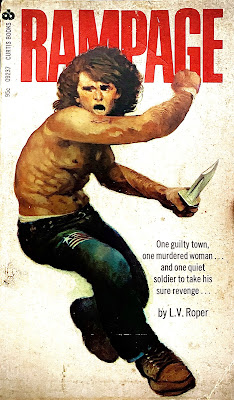Roper's idea for Rampage was simply to re-write David Morrell's 1973 novel First Blood. Obviously, names and places have been changed to protect the innocent, but Rampage is First Blood, or First Rambo, or whatever we are calling it these days. Here's how Roper's version of Rambo shakes out:
Somewhere in a tiny mountain town in Alabama, a young white school teacher defiantly decides that the region's barbaric racism must end. She orders the black and white kids to sit together in class instead of being divided by the invisible segregation barrier. The town's KKK warns her to stop, but she persists. Off the page (thankfully), four KKK members enter her house, chain her to a bed, and then rape her to death.
Not quite First Blood, but just hang in there.
In Vietnam, Mark Hastings reads a letter from his wife that suggests she may be in danger for combining the black and white kids in her class. He takes an emergency leave (AWOL) and heads home to screw his sister. No, wait, that was Brother and Sister. He goes home to kill the mobsters that have ransacked his family. No, wrong. That was War Against the Mafia. He comes home to become entangled in small town injustice from a bigot cop and his posse of cops and friends. That's First Blood. Also Rampage. Sort of.
Hastings, an Army Green Beret, hitchhikes into a small mountain town in Alabama and discovers that his wife has been killed. He then targets and kills the four men responsible by using hit-and-run attacks from his wilderness hideout in the hills. He also uses a special knife (I suspect a plain 'ole K-Bar) to gut his victims.
Eventually, the town's sheriff, who is a KKK member, organizes a posse to hunt and kill Hastings in the mountains. But, Hastings uses some deadly snares to trap and kill his opponents. He also has a .22 Colt Woodsman that he puts to good use. Needless to say, there is a huge body count in this one. After the police fail to apprehend Hastings, a Colonel from a local National Guard unit comes in to sympathize with Hastings. The end has a delusional Hastings being hunted by his fellow Green Beret A-team.
There are no doubts that Rampage is a First Blood knockoff, like 1987's Black Moon by Ron Potts. I can't fault Roper because First Blood, and the Rambo films, inspired countless profitable pop-culture ventures. Despite being unoriginal and repetitive, Rampage is pretty darn good. Roper is an excellent writer who had a knack for this sort of suspenseful, cagey action formula. He also tackles a number of deep psychological issues of the era - Vietnam, social inequality, poverty, and plain 'ole everyday abuse of power. I can't remember the page, or the exact wording, but Roper has a character cleverly comparing Hasting's possible arrest for murder in Alabama coming at a time that he's been awarded for murder in Vietnam. These statements are essential to the storytelling, as borrowed as it may be, and adds a little extra emotional "oomph".
If you love these outdoor wilderness survival novels, or enjoy a great small town vigilante romp, then Rampage is worth pursuing. Keep in mind that it is a copy of First Blood, so be sure to read Morrell's classic, more superior novel first. Rampage is a blue-light special version of it that still possesses a level of nostalgic enjoyment.
Buy a copy of this book HERE




